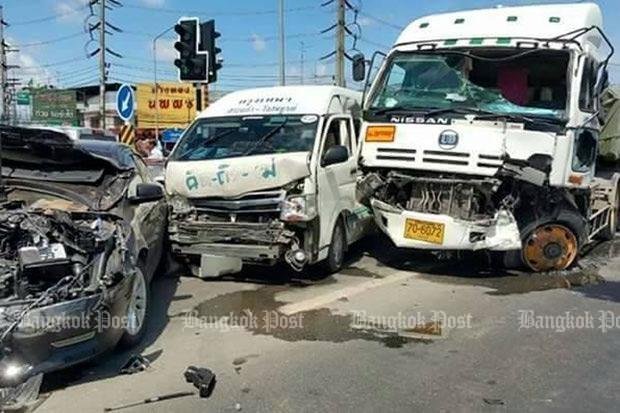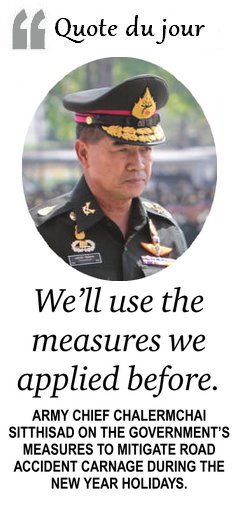
The biannual "seven dangerous days" of road casualties begins today. For the next week, government spokesmen and the mainstream media will be providing daily reports on the heavy highway death toll. This is a very safe prediction for two reasons. First, the world's most dangerous highways are not going to become suddenly safe and accident-free. In addition, the government appears to have run out of any fresh ideas to prevent the New Year and Songkran highway carnage.
This year's week-long campaign of dangerous days is remarkable for one main reason. It is that government and security agencies appear helpless to combat the upcoming casualty toll. After a month of deliberation, the government's lack of any ideas for a strong campaign is notable. In effect, the government, army and police are saying this year's attempt to mitigate road accidents, deaths and injuries is to do things exactly as they did last December and April.

Hoping for better results is dreaming. The most dangerous roads and highways on Earth will not become safer because of false wishes. The threats by government and police this year -- more checkpoints, seizing vehicles from drink-drivers -- have never reduced the accident or death tolls. Last year, when officials all the way up to Prime Minister Prayut Chan-o-cha threatened the harshest measures ever, there was a record "dangerous days" death toll of 478.
Of course this is unacceptable. No country should have to watch citizens die, mostly needlessly, at the rate of one every 21 minutes. But for reasons that defy logic, both the government and the security community seem to be ready to swallow their propaganda without question.
Seven-day campaigns are obviously ineffective or useless. Rather than search or ask for better ideas, governments merely repeat already disastrous campaigns.
Here are some of the failed policies the government is promising will stem the highway slaughter throughout the next week. Bus drivers will face urine tests. Police will impound motorcycles if riders don't have helmets. The number of checkpoints will be increased. The army will help to man the checkpoints. The checkpoints will be increased even more in 100 "high-risk" areas across the country.

All of this triggers a strong feeling of deja vu. We have been here before -- last April and last December-January for example. One of the major flaws in so-called safety campaigns is the lack of resolve. Even if police enforce all of the above for the full week, next Thursday the campaign will be abandoned.
Arguably, the main reason for the failure of safety campaigns is their dependably short lifespans. In countries with low highway accident and death tolls, there is constant enforcement of strict laws. Stopping the chronic problem of drink-driving requires strong enforcement 365 nights a year. Motorcyclists will buy and wear helmets if they know they will be stopped, fined and risk seizure of their bikes every time they drive without one.
Unrelenting enforcement of the law against dangerous drivers will mitigate the accident rate. But much more is needed to make this country a safe-driving zone. Driver education is badly needed at the middle- and high-school level. A points system against drivers' licences, now being adopted at long last, will help.
Driving safely is an attitude problem as much as a legal one. Selfish driving, too slow and too fast, causes accidents directly, while adapting to road and traffic conditions prevents them.
It is disappointing to see the government throw up its hands today. The "seven dangerous days" campaign is a good idea, but only to raise the awareness of drivers. By itself, such a short campaign, designed to end in a week, cannot achieve much.
